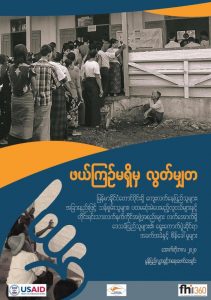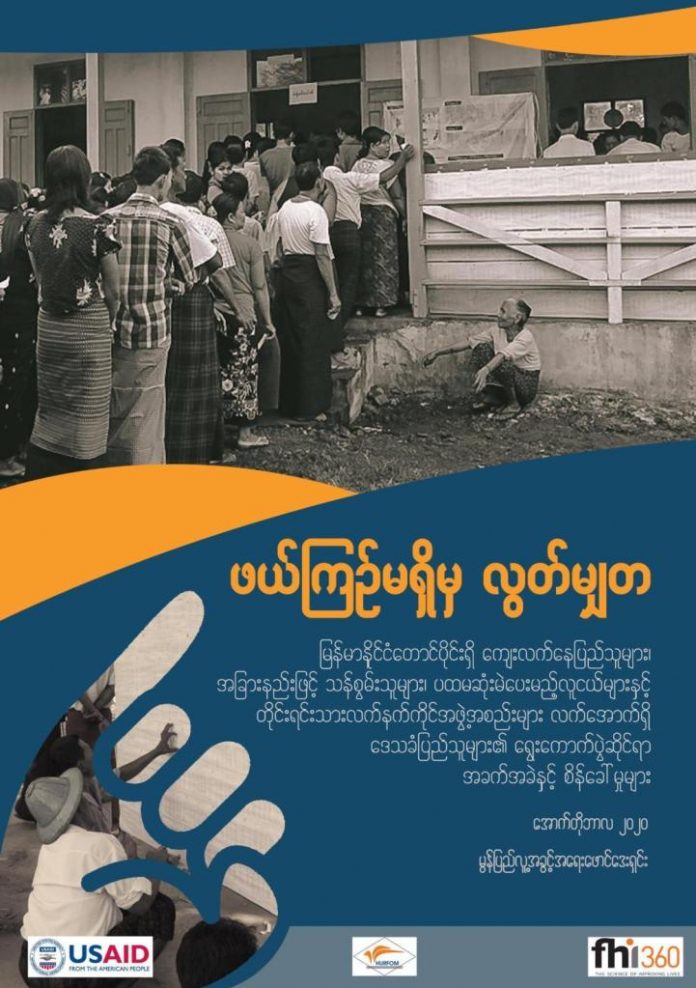On October 8, 2020, the Human Rights Foundation of Monland (HURFOM) released a report detailing electoral barriers and challenges facing marginalized populations in Southern Myanmar. The report is titled, “Without Inclusivity, No Free and Fair Elections”.
During the months of August and September information was collected from 129 villagers living in 30 different villages across six townships in Mon and Karen States, and from the Tenasserim Division. There were also two group discussions held in Kyaikmayaw and Thanbyuzayat Townships.

Nai Aue Mon, Program Director of HURFOM, pointed out that, “This is the third election under the 2008 constitution. In the 2015 election, only half of eligible voters in Mon State appeared at the polling stations. That number was too low. They wanted change but why didn’t they come to vote? We have done this report in order to address the electoral challenges facing voters.”
The report highlights electoral challenges facing rural populations, especially women, the elderly, Internally Displaced Persons (IDPs), first time voters, persons with disabilities, as well as people under the control of Ethnic Armed Organizations (EAOs).
According to HURFOM’s report “Freedom Without Exclusion”, the most electorally marginalized populations are persons with disabilities and those living under the control of EAOs. These communities often have no access to information related to the election, are not included on the voter list, or face problems related to polling stations.
“We urge ethnic leaders to make policy decisions that [support] every citizen’s right to vote for the political party they believe in. [This action will] make clear that we are under a democratic rule.” Nai Aue Mon told the Mon News Agency (MNA).
Currently there is no clear policy between the Union Election Commission (UEC) and EAO’s, outlining how people residing within ethnically controlled areas can obtain citizenship and the right to vote.
Some EAO’s do support voting rights for residents of ethnically controlled areas. Nai Aung Ma Ngay, is a member of the New Mon State Party (NMSP) Central Executive Committee and in charge of their Central Political Department.
He said, “If our armed group has 10 household registration forms, we allow them to go to the polling station.”
Mon civil society organizations have conducted a census showing 2,000 unregistered people are living within the NMSP-controlled areas since last March. The NMSP has submitted this report to the Mon State government.
It is estimated there are 50,000 unregistered voters throughout the country.
The Mon State Director of the Immigration Department has noted there is not sufficient time for unregistered voters to obtain a National Registration Card (NRC).
As a temporary remedy, an official letter has been sent to the Union Election Commission, requesting they provide a letter of recommendation, in the name of unregistered individuals, in order to allow them to vote in the upcoming election.
The HURFOM report stresses, there should be an equal and inclusive environment for better elections. All stakeholders should address the concerns raised in their report. The report argues that only by finding ways to address these challenges can a true democracy, and a peaceful federal union be established.
HURFOM is a Mon State-based human rights foundation for the restoration of democracy, human rights and genuine peace in Burma.

